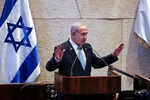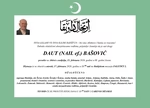MP: Serbia's National Security and Defence Strategy is a threat to Bosnia

The National Security and Defence Strategy that was recently presented in Serbia represents a “serious threat” to Bosnia and all political forces that advocate for an independent, integral and democratic Bosnian state must respond to it, MP in Bosnia’s House of Peoples and the deputy leader of the Social Democratic Party (SDP), Denis Becirovic, said on Sunday.
Oglas
Serbia’s Defence Minister, Aleksandar Vulin, presented on Tuesday the document which says that the preservation of Republika Srpska (RS), one of Bosnia’s two semi-autonomous entities, is among Serbia's top foreign affairs priorities.
“We are talking about a serious threat to the state of Bosnia and Herzegovina which is contained in an official act of the highest legislative body of Serbia. To make matters worse, we are talking about a threat coming from the only state in Europe which was condemned throughout the world for breaching the Convention on the Prevention and Punishment of the Crime of Genocide,” Becirovic said.
Adopting the Strategy represents an expression of Serbia’s territorial claims toward Bosnia and Herzegovina, he said, adding that “with such a destructive policy, Serbia’s President Aleksandar Vucic and Defence Minister Aleksandar Vulin reaffirm Serbia’s hegemonism from the time of the regime of Slobodan Milosevic."
Oglas
Becirovic argued that a policy “which publicly propagates the resurrection of the already defeated Greater Serbia ideology and policy, which caused immeasurable wartime suffering in the entire region, represents a direct threat to numerous states in the Western Balkans” and that such a policy is “not to be underestimated.”
“Such a Serbia does not represent a state with which it is possible to develop friendly relations at this moment. The progressive forces in Bosnia and Herzegovina and outside the country must inform all of Europe and the world that the Serbian greater state project is not only a thing of the past,” he stressed.
The SDP politician also asked how Serbia would act if its neighbouring countries would name part of its territory as “zones of special interest for security and defence.”
When analysing Serbia’s policy toward Bosnia after the war, it can be seen that the country “is still systematically preparing for breaking up the state of Bosnia and Herzegovina,” he said.
Oglas
“It is time for Serbian officials to come to their senses and help people both in Serbia and in Bosnia and Herzegovina breathe easy and open a new era of peace, mutual respect and progress,” he concluded.
Kakvo je tvoje mišljenje o ovome?
Učestvuj u diskusiji ili pročitaj komentare
Oglas
Kakvo je tvoje mišljenje o ovome?
Učestvuj u diskusiji ili pročitaj komentare
Oglas





 Srbija
Srbija
 Hrvatska
Hrvatska
 Slovenija
Slovenija



























































